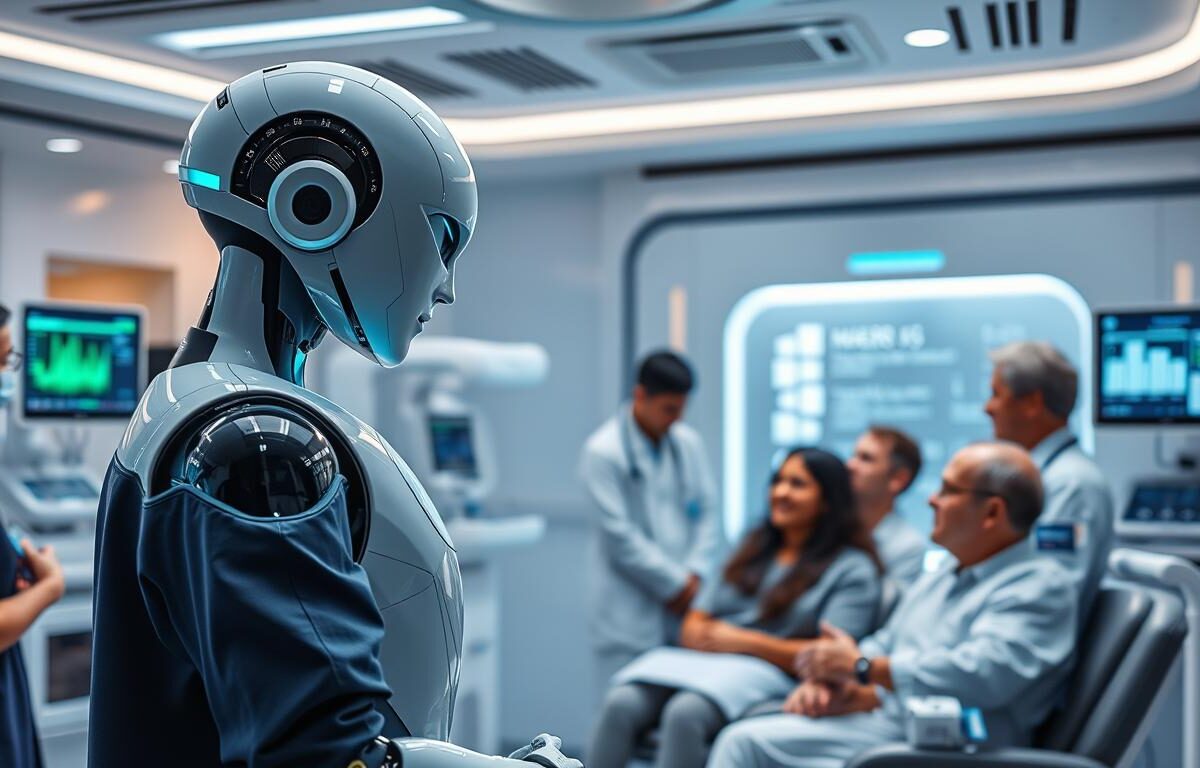The use of AI agents for healthcare is creating big changes. These changes enhance how we diagnose illnesses, customize treatments, and handle admin work. Through advanced algorithms, AI tech analyzes medical data. This increases accuracy in diagnoses and makes treatments more effective. Also, AI healthcare solutions ease the admin load for clinical teams. This means fewer mistakes and better efficiency overall.
Key Takeaways
- AI agents in healthcare enhance diagnostic accuracy and customize treatment plans.
- Smart healthcare technology simplifies administrative processes, reducing staff workload.
- AI-driven chatbots provide 24/7 patient support for accessing information and scheduling.
- Predictive analytics help in the early identification of potential health risks, promoting proactive patient care.
- Automation of routine tasks through healthcare automation allows staff to focus more on patient care.
Understanding AI Agents in Healthcare
In recent years, we have seen big changes in healthcare due to AI agents. These AI systems quickly and accurately go through a lot of medical data. They are key for a better and skilled healthcare system. But what are these AI agents? And how do they change the way we do medical care?
AI agents in healthcare are advanced systems that improve many aspects of care. They use machine learning, NLP, and data analytics. These tools do jobs that would normally need a person. For example, they are crucial in looking at medical images. This improves the accuracy of diagnoses and patient care. They also make personalized treatment plans by looking at patient data. This leads to healthcare that better fits each person’s needs.
Different AI agents do different jobs in healthcare:
- Simple reflex agents: They do basic tasks by following simple rules.
- Model-based reflex agents: These agents use models to deal with complex data and predict what will happen next.
- Goal-based agents: They work towards specific goals by looking at different options.
- Utility-based agents: They choose the best action based on a guiding principle for decisions.
- Learning agents: They get better over time through experience.
- Multi-agent systems: They work together to solve hard healthcare problems.
- Hierarchical agents: They operate on different levels to make healthcare more efficient.
AI agents are now a real part of everyday healthcare, not just an idea. They make healthcare operations better and more effective. A study shows 79% of healthcare workers think AI will greatly improve healthcare.
Key drivers of AI agents’ progress include machine learning and NLP. Machine learning is used for predicting things, like detecting diseases early. It also monitors health through wearable devices. NLP makes talking to patients easier by understanding and responding to human language. This makes healthcare more user-friendly and quick to respond.
| Aspect | AI Contribution |
|---|---|
| Medical Imaging | Better analysis and more accurate diagnoses |
| Treatment Planning | Customized plans based on data |
| Operational Efficiency | More efficient use of resources and workflows |
| Patient Interaction | Better support through virtual helpers |
The path for AI in healthcare is still unfolding. It’s changing the game for doctors and patients alike. As these smart systems become more common, healthcare providers must learn to use AI agents fully. This will help provide the best care possible.
The Evolution of Artificial Intelligence in Healthcare
The Early Applications of AI in Healthcare started a big change. We saw this first at the 1956 Summer Dartmouth Conference. Since then, AI has grown and changed healthcare in many ways.
In the 1980s, DXplain was made at the University of Massachusetts. It helped doctors by suggesting possible illnesses based on symptoms. This was the beginning of AI in diagnosing and in smart helpers for healthcare.
Today, AI and IoT work together for ongoing health checks. This mix lets AI give instant feedback to make patient care better. Breakthroughs in AI-driven diagnostics are clear examples of this progress.

Now, machine learning and deep learning are key. But, we still face issues like data privacy and the need for human wisdom. AI now helps diagnose, create personal treatments, and guides doctors in making decisions.
AI’s impact is seen in many studies. One study showed a deep learning model predicting seizures with almost 99% accuracy. This was using data from Children’s Hospital Boston and MIT. Also, AI was better at finding breast cancer than human radiologists, showing its huge potential in healthcare.
IBM Watson and Google’s Lymph Node Assistant are big innovations. Watson beat Jeopardy champs, and Google’s tool can classify biopsy samples with high accuracy. These help doctors be faster and more accurate in diagnosing.
From the first steps to now, AI has shown its vast potential. It keeps changing how we care for patients and deliver healthcare.
How AI Agent for Healthcare is Transforming Patient Outcomes
AI agents in healthcare are improving how we look after patients. They’re making diagnoses more accurate and treatments more personalized. This is thanks to machine learning, natural language processing (NLP), and deep learning. These tools can spot patterns in big data sets that humans might miss.
Personalized treatment plans stand out among the advancements made by AI in healthcare. AI looks at various patient data like medical history and lifestyle. Then, it suggests treatments that fit the patient perfectly. For example, systems that use both EHRs and wearables can give a full view. This helps diagnose accurately and recommend the best treatments.
Predictive analytics lets doctors see health problems before they start. This means patients get proactive care. Predictive analytics finds patients at high risk early on. This helps stop serious problems before they get worse.
AI also leads to better real-time patient monitoring with devices and sensors. These can keep a constant check on health and act fast if something goes wrong. For example, AI can watch vital signs and send for help at the first sign of trouble.
| AI Technology | Application in Healthcare | Impact |
|---|---|---|
| Machine Learning (ML) | Predictive analytics and anomaly detection | Enhanced Diagnostic Accuracy |
| Natural Language Processing (NLP) | Interpretation and generation of human language | Improved Patient Communication |
| Computer Vision | Analysis of medical images | Early Disease Detection |
| Deep Learning | Modeling complex patterns in large datasets | Enhanced Diagnostic Accuracy |
| Data Integration and Analysis | Consolidating information from diverse sources | Comprehensive View of Patient Health |
AI is not just about better diagnoses and treatments. It’s also making healthcare run smoother by helping with admin tasks. As AI gets better, we’ll see even bigger changes. This means more accurate diagnoses, effective treatments, and efficient healthcare.
NLP in Healthcare: The Role of Intelligent Virtual Assistants
Natural Language Processing (NLP) is improving patient care with smart virtual assistants. These tools help with symptom checks, teaching patients, and answering questions in real time. They’re always on, cutting down wait times and making health care easier to get.
AI health assistants do many jobs once done by people. For example, 78% of doctors say these assistants are great for setting up appointments. This frees up doctors to do more important work.

But there’s more to NLP in patient care than making appointments. Virtual assistants give ongoing help for medical advice or aid. The World Health Organization’s COVID-19 assistant helped 12 million folks early on, fighting false info in the pandemic.
AI symptom checkers, like Symptoma, guide people through diagnoses with NLP. This helps people know if they need to see a doctor, making better use of health resources and cutting unnecessary visits.
Companies like IBM Watson Health and Google Cloud are leading in NLP for health care. Their tech looks through lots of medical articles. This gives doctors key insights to make better choices. NLP also predicts how patients might do, helping with treatment plans.
NLP helps the healthcare system by reading clinical documents and getting info from health records. Epic Systems’ NoteReader, for instance, makes documenting care easier and more accurate. This makes health care work better and improves patient results.
The need for medical virtual assistants is growing fast, says a report. By 2029, they might make a lot more money because of how important they are in health care.
Even with concerns about data safety and quality, NLP’s potential in health care is huge. As it gets better, we’ll see more uses in patient care and the health system, making things run smoother and helping patients more.
Key Benefits of AI Agents in Healthcare
AI agents are changing healthcare in big ways. They bring huge benefits like better efficiency and more automation. Tasks like keeping records, setting up appointments, and checking test results are simpler. AI can also quickly look at chest X-rays and get accurate results. They found signs of tuberculosis with 98% accuracy, better than the 96% by human doctors.
This means doctors can diagnose faster. Before, experts needed about 4 minutes to examine X-rays. Now, AI can do it in just seconds. This speed helps in treating patients quicker.
AI also helps save money in healthcare. It’s expected to save up to $150 billion each year in the US. It cuts down costs by making things run smoother and reducing mistakes. This makes care cheaper for patients.
It also means hospitals can manage their money better. By using AI, they can avoid errors and make billing more efficient. AI models that are ready to go are cheaper than making new ones from scratch.
One more big plus is how AI helps patients directly. AI virtual helpers can watch over patients’ health all the time. They give updates and reminders, which is great for people with ongoing health issues. Studies show 62% of patients are okay talking to AI for help and advice.Learn more about AI in healthcare.
This support makes sure patients know what’s going on with their health. They feel part of their care process. This leads to happier patients and better health outcomes.
To wrap it up, AI in healthcare is making things better in many ways. It’s making care faster, cheaper, and more personal. As AI grows, and is expected to reach over USD 187.95 billion by 2030, healthcare needs to keep up. This will help everyone enjoy the benefits AI brings.
FAQ
What fundamental technologies power AI agents in healthcare?
AI agents in healthcare rely on machine learning, natural language processing (NLP), and data analytics. These tools help make accurate diagnoses by examining medical images and patient information. They also create personalized treatment plans with advanced AI.
How have recent advancements in AI-driven diagnostics impacted healthcare?
Recent AI advancements have merged AI with IoT to monitor health continuously. This has led to more accurate diagnostic tools and care plans that are tailored to each patient. Patient care has greatly improved as a result.
What role do predictive analytics play in personalized treatment plans?
Predictive analytics let AI detect patterns in data that humans might miss. This makes it possible to design treatment plans that are really specific to each person. It involves looking deeply into a patient’s data and predicting how they will respond to treatments. This kind of analytics also means doctors can care for patients proactively.
How does natural language processing (NLP) improve patient interaction in healthcare?
NLP changes how patients talk to healthcare systems with smart virtual assistants. These assistants can chat like humans, helping with symptoms, giving instructions, and answering questions in real-time. This makes healthcare more accessible and improves the overall patient experience.
What are the key benefits of AI agents in healthcare in terms of efficiency and cost reduction?
AI agents boost efficiency by automating tasks like documenting and scheduling patients. This helps manage resources better, cuts down on errors, and reduces costs by limiting manual work. They also improve patient interaction through personal communication on AI platforms.
How do AI agents enhance diagnostic accuracy in healthcare?
AI improves diagnosis accuracy with complex algorithms that analyze medical data in depth. These systems spot patterns and abnormalities in medical images and patient records that humans might overlook. This leads to more precise diagnoses and tailored treatment plans.



